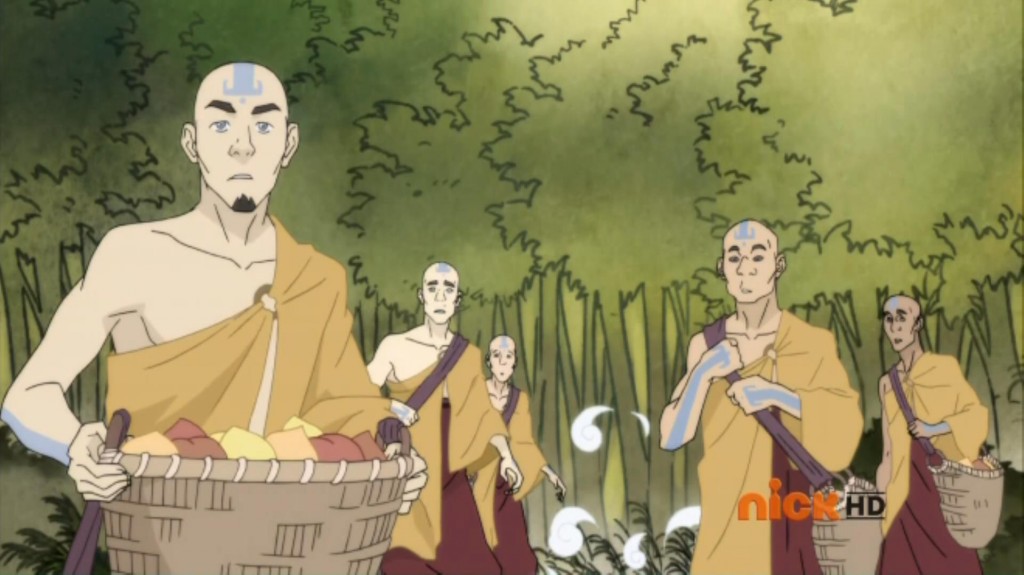10.19
In honor of Alaska Day, Nick’s given us a double-offering of Korra. And to make sure it’s not a hollow gift, these episodes were actually good. A bit derivative, yes, but I liked them. It was nice to get a little origin story that stood apart from the Water Tribe’s monotony. This reminded me of how good Avatar could be, and what the show has to offer to stand apart from other stuff on basic cable. Yeah, it’s not much. But this is a nice gem to look back on whenever people eventually re-evaluate the second season.
Korra is trying to be that show where all the episodes are chapters to one bigger story, like the second season of Young Justice. But like Young Justice, the chapters only offer more questions than answers and lead to a bigger disappointment than a standalone episode would normally offer. The flaw with arc-driven shows is that if there’s one really bad episode, all of the others will be affected by the plot elements from that one. You can’t even pretend that episode doesn’t exist, because you’ll have to watch that in order to understand what happens next. That stain is stuck with you until the season ends. A season arc is something that entices writers and fans alike due to the promise of a fluid story, but it also leads to a bigger gamble if the staff doesn’t devise the plan with care. That’s what Korra felt like before this episode, a string of chapters where flaws that would normally affect one week were stretched across the whole season.
So I guess this is where Korra finds its stride, by using short stories throughout to unfold the mythology at large rather than trying to tell one epic tale at once. And you know this won’t be the last time we’ll hear of Vaatu and the harmonic convergence. If Unalaq doesn’t at least reveal how his plans are to use Vaatu as a trump card against the Southern Water Tribe or something, I’ll be rendered speechless. But using this as a jumping point works, because the two-parter told its own story while offering a single thread to tie it together with the season. This gives the writers more freedom to tell the main story while not getting tired over it. I know the episodic idea is unpopular, but a series of varied stories feel preferable to a drawn-out one with no real goal in mind.
But that’s enough about ranting on Korra’s story structure, so I’ll talk about Wan. I like him. He starts as kind of a roguish figure who has a heart but doesn’t have the head to use it properly. While he starts off as bull-headed like Korra, he openly shows good intentions throughout the two-parter like when he saves the cat-deer. These small moments—including resisting attacking Chou—make him down-to-earth while foreshadowing his future as a sacred figure. It’s those subtle additions that make a good character. While Aang and Korra had the Order of the White Lotus to guide them along the right path, Wan didn’t have any of that. He had to find his own. I know, the show unfortunately utilizes quite a bit of exposition and montages in order to fit Wan’s story into forty minutes, but brevity is the soul of wit and all that.
If anything, this adds a “less is more” approach to the story by letting the characters’ short time give them distinction. Wan’s life with the spirits would probably be less whimsical if they spent an entire episode on that scene, so the brevity leaves more to the imagination. It makes the viewer wonder about what the spiritual age was like instead of spelling it out too much. After hearing Unalaq go on about being in touch with a divine nature, it’s nice to finally see what he’s talking about for once. Some of the scenes in these episodes were really interesting, with the animation being a bit breathtaking on occasion. Yes, most of it is ripped off wholesale from Spirited Away. They even have Jason Marsden play one of the spirits, for God’s sakes. But when you get down to it, anyone who prefers Mako over repackaged Miyazaki is crazy. Avatar’s always been heavily influenced by Ghibli, and this is only the latest of many examples.
But maybe I’ve grown too taxed by the previous episodes to wholly appreciate this week’s offering, since I kept wondering about certain things. Like, why would Wan be dumb enough to help Vaatu before hearing Raava’s case? I know being the first Avatar doesn’t equate to being the smartest, but that was an off-putting way to set up the plot. I could be nitpicking, but that one moment just got to me in the wrong way. Still, that scene can be forgiven by Wan having to pay with his friends’ lives for making that wrong decision.
So yeah, the show’s possibly back on track and I hope the rest of the season gets this good. And it didn’t even need Varrick.
